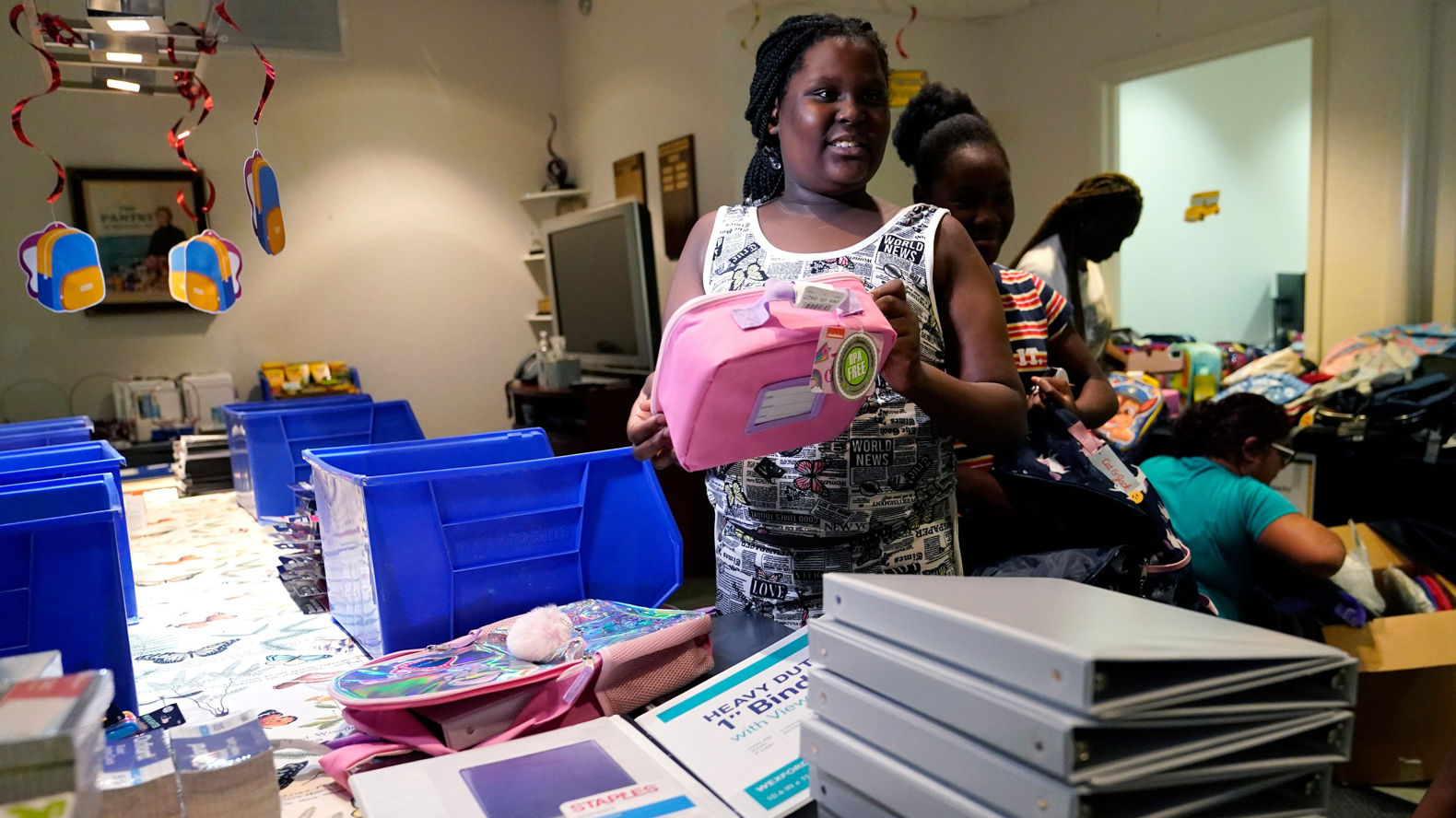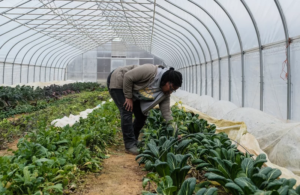These were supposed to be the relaxing years for Mercedes Bristol, a 68-year-old grandmother in San Antonio. Instead, she’s just picked up one grandchild from school and is on her way to pick up another in a car loaded with brownies and a turkey she’s donating for her grandkid’s high school band fundraiser.
In 2011, Bristol was 57 and working a state job when she became a full-time mom again, taking custody of five grandkids aged 3 months to 9 years after their parents fell into substance abuse issues and became negligent. Suddenly faced with a gaggle of unforeseen expenses, she ran the numbers: It made more sense to retire than to wrestle with the cost and logistics of childcare while still being able to afford to feed and clothe them all.
“I’m getting ready to have knee surgery in December,” Bristol said. “But what do you do? You have to raise your grandkids.”
The struggles she faced illustrate what a recently released report indicates: Families in which parents are absent and children are raised by grandparents or others close to them are more likely to face higher rates of hunger and food insecurity.
These “grandfamilies” – defined by the study as headed by grandparents, siblings, aunts, uncles or close friends – experience food insecurity at more than twice the national rate of families in general, while the rate among grandparents aged 60 and higher raising kids (22%) was more than triple the rate of similar households without children.
“A significant percent of grandparents taking care of their kids aren’t earning enough to support a family,” said Celia Cole, CEO of Feeding Texas, based in Austin. “That’s why you see rates that high.”
A variety of factors – from death, deportation, health or substance abuse issues – can account for parents being unable to care for their kids, prompting grandparents and other relatives to step in.
About 2.5 million children nationwide are members of grandfamilies, according to the report, which examined U.S. households from 2019 to 2020. One in four such families experienced food insecurity, compared to 15% of all families with children and about 10% of all households in general.
“These families often step into the role unexpectedly, so they’re often living on fixed incomes and all of a sudden trying to feed one child or more,” said Jaia Lent, deputy executive director of Generations United, the Washington-based agency that produced the report. “They’re trying to get formula and pay for diapers while paying for their own prescription medicines and their mortgage.”
While studies show being raised by a family member or close friend is the best option for kids whose parents are out of the picture, advocates say such circumstances can put children at higher risk of food insecurity since many such caregivers are not eligible for help available to traditional foster families. Some grandparents are forced to exhaust their life savings to keep pace.
Bristol wasn’t ready to raise one child again, much less five. She didn’t have enough beds and had to get a credit card to make do, and she was turned down for Temporary Assistance for Needy Families benefits because she owned a small SUV that couldn’t fit the car seats she suddenly needed.
The children’s mother, she said, had gotten $900 a month in child support, “but I got the kids and didn’t get any money. If you’re getting financial assistance, that should follow the child.”
While Bristol is now OK financially, having become of age to collect social security and retirement benefits, the struggles she experienced prompted her to help create Texas Grandparents Raising Grandchildren, an organization helping to link about 1,400 such families statewide to available resources.
Some grandparents have mortgaged homes to afford taking in grandkids, Bristol said, while others take the bus to buy groceries.
“There’s a lot of grandparents who cannot get back on their feet,” she said. “Some have social security and no other retirement. Those are the ones that rely on food pantries.”
Stepping up to help kids, left out of benefits
The Generations United report also found grandfamilies disproportionately consisted of Black, American Indian/Alaska Native, and in some areas, Latino families, communities for whom years of structural racism and discrimination have contributed to inequities and challenges in accessing support. For instance, while 14% of U.S. children are Black, 25% of children in grandfamilies are Black, the report noted.
Additionally, a disproportionate number of grandfamilies reside in the South, which has the highest percentages of food insecurity, the report found.
In Texas, advocates estimate between 250,000 and 300,000 kids are in so-called “kinship care arrangements “– the vast majority of them in informal situations, meaning they haven’t officially been placed there by the state and aren’t eligible for benefits available to formal foster-care families.
Lent, of Generations United, said the vast majority of such families nationally are raising children outside of the foster care system: For every child raised by a relative within the system, she said, 18 are being raised by relatives outside the system.
Such families, she said, shouldn’t be penalized for taking in kids just because they’ve been responsible about planning for their own retirement.
“They should not go hungry because they’ve stepped up to care for a child,” Lent said. “And they should not have to spend down their retirement before they’re able to qualify for benefits that may meet a child’s needs.”
At Crisis Ministries, a North Texas Food Bank affiliate based in Irving, Texas, that serves more than 700 families monthly, the portion of elders raising grandchildren has been steadily climbing in the last several years, said Ruby Sevcik, the agency’s CEO.
Since 2019, Sevcik said, the portion of households headed by individuals 60 and older that include grandchildren has climbed from 17% to 37.5%, and she’s expecting a similar figure this year. Some are caring not only for their grandchildren but their own parents as well, she said.
“The reality is that the cost of living has gone up significantly but not their social security,” Sevcik said. “Even those who had a decent pension or retirement are feeling the crunch.”
Rachel Cooper, director of health and food justice for Every Texan, a nonpartisan, nonprofit policy institute based in Austin, has heard from grandparents living in studio apartments and working retail jobs who suddenly took in children without the room or vehicles necessary to hold them.
“There are all these things that no one thinks about,” Cooper said. “When you have a new baby, your family throws a baby shower to help you out, but when these grandparents are asked to take in kids, there’s no baby shower, and the state disappears.”
TANF benefits can vary greatly from state to state, she said, and such programs often aren’t designed for the needs of grandfamilies.
“They’re based on nuclear families, and eligibility levels are really low,” she said.
Lingering trauma complicates ongoing struggles
Grandfamilies can also be saddled with emotional, mental and physical health issues as children separated from parents vent their anger on grandparents or other relatives.
“Even though being with family is usually better than being in foster care, those kids are just as traumatized as any child,” Cooper said. “They’ve lived through and seen things they shouldn’t have, and grandfamilies are left to figure out how to get them the extra services that they may need.”
In Victoria, Texas, Becky Ramirez has struggled to make ends meet since taking in her four grandchildren, all girls, six years ago. Her son had been incarcerated, and the kids’ mother “just dropped them off at CPS and turned her back on the kids” soon afterward, she said.
“It’s a big change from just doing for myself,” said Ramirez, 48, who makes $12 an hour at a retail sports store. “I’m having a hard time just putting food on the table and clothes on their back. It’s been real rough and I would lay there at night and cry to myself, but it’s hard to deny the kids.”
The girls, now ranging from 6 to 10, had breathing issues from having been around drug use, she said, and are often sick. The value of her home and vehicle made her ineligible for assistance, Ramirez said.
She gets up at 5 a.m., makes breakfast and drops the girls off at school, then goes to work. After work, she picks the children up from an after-school program.
“To start all over, it’s hard,” Ramirez said. “It takes a toll. Pretty much everything is on hold right now. There’s no going out by yourself – if I go to the store, I’ve got to take all the kids. But that’s what we do.”
Ramirez’s example shows how grandparents may struggle not only with the family circumstances that have called them to duty but with the loss of their identity as a grandparent or active retiree.
“As a grandparent, you don’t have to be the disciplinarian,” Lent said. “You can do the fun stuff and give them cookies and send them home. Now you’ve lost that opportunity.”
Additionally, advocates say, grandparents might sacrifice their own health to prioritize their grandchildren’s needs, forgoing doctor’s appointments, medications or physical activity.
“They may be forgoing their own meals or cutting down on quality so their grandchildren can eat as nutritiously as possible,” said Alex Ashbrook, director of root causes and specific populations for Food Research & Action Center, a Washington-based organization that collaborated on the report.
‘The new norm’
In its report, Generations United called for a number of solutions, including expanding Supplemental Nutrition Assistance Program access by creating a “child-only” benefit based on a child’s needs rather than household income; ensuring automatic access to free/reduced-price school meals for children living in grandfamilies; and increasing efforts to connect such families to available resources.
The White House recently announced a sweeping national strategy to reduce hunger, including identifying steps to better support grandfamilies – for instance, ensuring healthy school meals are available to all children and maximizing SNAP enrollment for eligible families.
Along with raising benefits, advocates say better targeted efforts need to be made to let elders know they’re eligible for SNAP assistance – for instance, tailoring outreach materials to visually reflect such families – and to erase the stigma they may attach to it.
Lent also suggested streamlining food support options, such as the Meals on Wheels delivery program, to better serve and reduce the strain on multigenerational families.
“There may be senior benefits at one location, but then they have to go across town to access child-nutrition benefits that they can’t access,” Lent said. “I’d really like to see the way we deliver nutrition support services recognizing that family members come in all ages.”
Adam Drewnowski, director of the nutritional sciences program at the University of Washington in Seattle, agreed.
“We need to consider children, parents and yes, grandparents all living under the same roof as the new norm,” he said.
For Bristol, the San Antonio grandmother, such an approach would have been handy. She relies on habits developed while she was still working, such as cooking meals the day before to be able to devote time to helping the kids with their homework and getting them to bed.
“I’m always a day ahead,” she said. “That’s been my only way to survive.”




